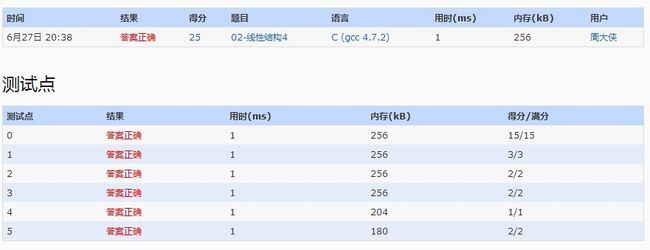02-线性结构4. Pop Sequence(25)
题目的意思:
栈的大小M,输入序列的长度N(默认序列即为1,2,3…,N),入栈出栈的顺序不定。有K个测试序列,判断每一个测试序列是否是可能的出栈顺序。
核心:从出栈顺序推测入栈顺序
关键点:当看到pop t时,那么一定要先push 1,2,3…t-1,t,即要先将小于等于**t的数都push入栈才能pop t。这个过程中检查**pop的次数是否等于N以及入栈的数目是否大于栈的容量M
#includeif(v[idx]==sta.top()){
sta.pop();
idx++;
}
else //sta.size>=cap; idx>N
return 0; //false
}
return 1; //true
}
int main(){
//int M,N,K;
cin>>M>>N>>K;
vector<int> vec(N,0); //N pop number
for(int i = 0; i!=K; ++i){
//input to vec
copy_n(istream_iterator<int>(cin),N,vec.begin());
cout << (check_stack(vec)?"YES":"NO")< 
语言技巧
copy_n(istream_iterator(cin),N,vec.begin());
当然也可以自己用c,写一下栈的操作,速度上会快不少
#includetop+1)if(top(ps)==v[idx]){
Pop(ps);
idx++;
}
else
return 0; //false
}
return 1;
}
int main(){
//输入
scanf("%d %d %d",&M,&N,&K);
int *v = (int *)malloc(sizeof(int)*N);
int i;
for(;K!=0;--K){
for(i = 0; i!= N; ++i)
scanf("%d",v+i);
if(check_stack(v))
printf("YES\n");
else
printf("NO\n");
}
return 0;
} 
